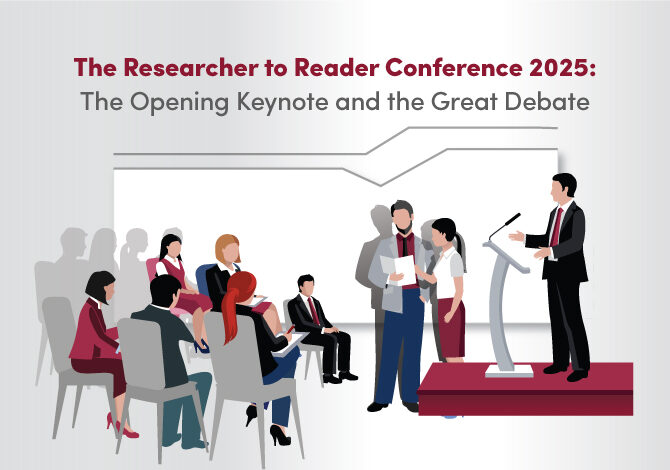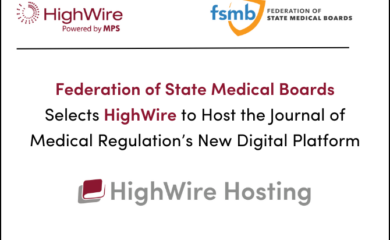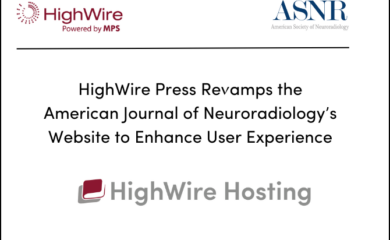Tony Alves, SVP of Product Management, and Joshua Routh, Product Director, recently attended the Researcher to Reader (R2R) Conference at the historic BMA House in London. Designed to bring together researchers, publishers, librarians, and other professionals in the scholarly information industry, the conference fosters dialogue on the evolving landscape of research communication. The general sessions covered a wide range of pressing topics, from research integrity and peer review innovations to open science and metadata standardization. However, the heart of the conference lies in its workshops—interactive sessions that allow participants to deeply engage with specific challenges and collaborate on shared visions and practical solutions. This is the first of four blog posts exploring key discussions and takeaways from the R2R 2025 conference, highlighting insights that are shaping the future of scholarly publishing.
The Opening Keynote: A Call for Open Access and Research Integrity
The Researcher to Reader (R2R) 2025 conference opened with a thought-provoking keynote by Professor John Willinsky, founder of the Public Knowledge Project (PKP) and emeritus professor at Stanford University. Willinsky, a long-time advocate for open access, framed his speech around research integrity, public trust, and the evolving scholarly publishing landscape.
The Evolution of Open Access and Public Knowledge
Willinsky began with a personal reflection on his journey—from a literacy educator to an open-access pioneer. His motivation for founding PKP stemmed from the realization that scholarly research, largely funded by public institutions, was locked behind paywalls, inaccessible to those outside elite institutions. This realization fueled his mission to make research truly public, leading to the creation of Open Journal Systems (OJS), an open-source publishing platform now widely adopted, particularly in the Global South. According to Willinsky:
- 80% of OJS implementations are in the Global South, where traditional publishing models are less dominant.
- 88% of PKP journals are indexed in Google Scholar, yet only 1.2% appear in Web of Science and 7.2% in Scopus, reflecting biases in global research visibility.
Research Integrity Under Threat
Willinsky highlighted major threats to research integrity, including rising retraction rates, the proliferation of predatory journals, and the misuse of flawed research in public discourse. He cited a disturbing example involving Robert F. Kennedy Jr., who referenced a non-indexed, anti-vaccine-funded article during a U.S. Senate confirmation hearing. Such incidents, he argued, demonstrate the urgent need for industry-led initiatives to counter misinformation.
One of his proposed solutions was the Publication Facts Label (PFL) — an open-source tool inspired by food nutrition labels, designed to provide readers with transparency regarding a paper’s peer-review process, funding sources, and editorial policies.
Sustainable Open-Access Models and Copyright Reform
Addressing sustainability concerns, Willinsky endorsed the Subscribe to Open (S2O) model, where libraries continue to support journals financially while ensuring content remains freely available. He also called for copyright reform in scholarly publishing, comparing the industry’s stagnation to the music industry’s pre-Spotify era. Drawing parallels to Taylor Swift’s activism in reshaping digital music rights, he argued that scholarly publishing needs similar disruptive reform.
Willinsky concluded by emphasizing that we are in the early decades of a new publishing era, one as transformative as the invention of the printing press.
The Debate: Are Scholarly Publishers Still Necessary?
The conference also featured a lively debate moderated by Rick Anderson (Brigham Young University) on the motion “Scholarly Publishers Are No Longer Necessary.” The debate pitted Caroline Black (Cambridge University Press) against Keith Webster (Carnegie Mellon University), with each presenting sharply contrasting views on the future of publishing.
The Case for Eliminating Publishers
Caroline Black argued that scholarly publishers are an outdated obstacle to knowledge dissemination and that their functions can now be replaced by decentralized, technology-driven models. Key points from her argument included:
- Journals were once necessary but now hinder scientific progress by prioritizing impact metrics over research quality.
- Preprints provide a more democratic and efficient system, allowing for rapid feedback from a broader community.
- Open-access models demonstrate that publishers slow down progress by protecting profit-driven subscription models.
- The Version of Record (VoR) concept is outdated, failing to reflect the iterative nature of modern research.
Black concluded that publishers are failing as stewards of the scholarly record, as evidenced by the increasing number of retractions and instances of research fraud slipping through peer review.
The Case for Preserving Publishers
Keith Webster countered with the argument that publishers play a vital role in preserving research integrity and providing essential infrastructure for scholarly communication. His main points were:
- Publishers ensure quality control through rigorous peer review, safeguarding against the spread of misinformation.
- Metadata, indexing, and archival systems require publisher investment, ensuring research remains discoverable and preserved long-term.
- Without publishers, researchers would be overwhelmed with administrative tasks, leaving little time for actual science.
- Predatory publishing thrives in the absence of quality control, demonstrating that decentralized models lack safeguards against fraudulent research.
Webster warned that eliminating publishers would lead to a fragmented, chaotic ecosystem where misinformation flourishes unchecked.
Audience Perspectives and Rebuttals
The debate sparked a range of audience reactions:
- Some agreed that publishers are vital for maintaining metadata, standards, and research organization.
- Others argued that peer review should be managed by institutions and research communities, not commercial publishers.
- A major point of contention was the cost of maintaining publishing infrastructure — supporters of publishers noted that open-access repositories lack financial sustainability.
Ultimately, the debate underscored the tension between the need for scholarly quality control and the desire for a more open, decentralized research ecosystem.
Connecting the Keynote and the Debate
The opening keynote and the debate were deeply interconnected, reflecting contrasting visions for the future of scholarly publishing:
- Willinsky’s keynote highlighted the promise of open access while acknowledging the sustainability challenges faced by non-commercial publishing models.
- The debate explored the viability of a publishing landscape without traditional publishers, with one side advocating for technological solutions and the other warning of the risks of decentralization.
- Both sessions raised concerns about research integrity, with Willinsky proposing tools like PFL and the debate emphasizing the role of publishers in ensuring quality control.
There are also striking parallels:
- Willinsky’s critique of the traditional publishing model aligns with the argument for eliminating publishers, particularly in his emphasis on decentralization, open-source technology, and alternative sustainability models.
- The debate’s emphasis on research integrity mirrors Willinsky’s concerns about predatory publishing and retractions, underscoring the necessity of safeguards regardless of whether publishers remain central.
- Both sessions addressed the power dynamics of scholarly communication—while Willinsky argued that researchers and institutions should reclaim control over dissemination, Webster defended the role of publishers in maintaining order and trust.
Ultimately, both discussions pointed to an urgent need for reform in scholarly publishing — whether through open-access innovations, stronger integrity safeguards, or restructured business models. The conference highlighted a critical question: who should bear the responsibility for ensuring access, sustainability, and trust in scholarly publishing?
A Crossroads for Scholarly Publishing
The R2R 2025 conference opened with a clear message: scholarly publishing is at a crossroads. Willinsky’s vision of a new publishing era is already materializing, but questions remain about how best to balance openness, sustainability, and integrity. As the industry grapples with these challenges, one thing is certain: change is inevitable, and the scholarly community must be prepared to shape its future.
– By Tony Alves
Read the next part



